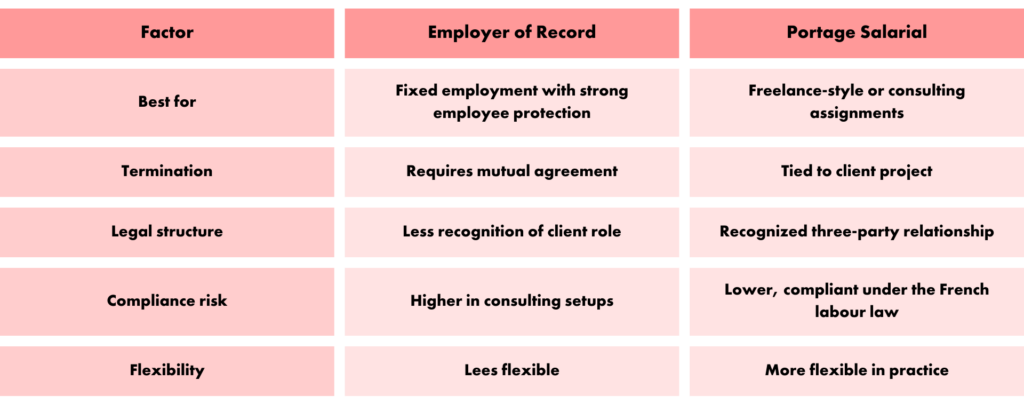EOR vs. Portage in France: What’s the Difference?
When it comes to employing talent in France without setting up a legal entity, two common solutions come to the surface: Employer of Record (EOR) and Portage Salarial (also known as umbrella employment). At Parakar, we offer both models however they serve different purposes and come with different implications for clients and employees alike.
Let’s break down the key differences to help you decide which setup is right for your business.
What are EOR and Portage?
When hiring talent in France without setting up a local entity, two popular options are Employer of Record (EOR) and Portage Salarial, each with its own legal structure and use cases.
Employer of Record (EOR) is a model where an EOR provider acts as the legal employer of your worker in France. We handle all employment responsibilities, including payroll, tax compliance, social contributions, and HR administration. Meanwhile, your company remains in charge of the employee’s day-to-day work. This setup is ideal for long-term employment relationships with a clear reporting line to the client company.
Portage Salarial, or simply Portage, is a uniquely French employment model that offers greater flexibility. It’s designed for professionals working on a project or consultancy basis. In this setup, the worker is officially employed by a portage company, but the relationship is clearly structured as a three-party arrangement between the employee, the client, and the portage provider. This model allows the worker to operate with a level of autonomy similar to freelancing, while still benefiting from the legal protections and social security coverage of a standard employment contract. Portage is particularly well-suited for short- to mid-term assignments or when engaging independent consultants in a compliant way.
Both models are compliant, but depending on your business goals, one may suit your needs better than the other.
Compliance and legal risks
EOR: Higher risk in consulting setups
In cases where EOR is used for consultancy-style work, there’s a potential risk of co-employment or illegal employment claims. This is because the end-client isn’t officially recognized as part of the employment relationship even though, in practice, they direct the employee’s day-to-day work.
Portage: Recognized triangular relationship
Portage is the only legally recognized model in France that clearly defines the tripartite relationship between the legal employer, the employee, and the client. It provides a compliant and transparent structure, minimizing the risk of legal complications. That said, it’s still a relatively new model. While it’s compliant, there’s limited case law so far, which can make it feel like a bit of a grey area.
Minimum salary requirements
Portage in France is regulated under specific salary thresholds that align with the French social security ceiling, which is updated annually. Here’s what you need to know:

Termination process
EOR: Employee in control
Under the EOR model, terminating an employee in France is a formal and often delicate process. The most common approach is to sign a Mutual Termination Agreement (MTA), which requires the employee’s full consent. While this protects the employee’s rights and aligns with French labour laws, it also puts the negotiating power in the employee’s hands.
If the employee doesn’t agree to the proposed terms, they can demand a significant financial package in exchange for their signature, especially if they know the client wants to end the contract quickly. This can lead to long negotiations, legal complexities, and high termination costs, making it a potentially risky and expensive path for clients looking for flexibility.
Portage: Client in control
Portage offers a more flexible and client-friendly alternative when it comes to termination. While the preferred approach is still to reach a mutual termination agreement with the employee, the Collective Bargaining Agreement (CBA) that regulates portage in France introduces an important distinction. The employment contract under portage is only valid as long as there is an active commercial agreement between the portage company and the client.
If the commercial relationship ends, the portage company has a legal basis to terminate the employee’s contract, even without the employee’s consent. This arrangement gives the client more control over the process and typically makes terminations faster, less costly, and easier to manage than with the traditional EOR model.
When to choose EOR versus Portage?

Making the right choice between EOR and Portage
Both EOR and Portage are effective ways to engage talent in France without a legal entity, but understanding the differences is key to choosing the model that fits your needs. If your priority is flexibility and compliance in a project-based setup, Portage is likely the better fit. For more traditional employment setups with a long-term view, EOR might still be appropriate but bear in mind the challenges with termination.
At Parakar, we’re here to guide you through every step of the process, whichever model you choose. Want to know more about how Portage or EOR could work for your team in France? Let’s talk.


